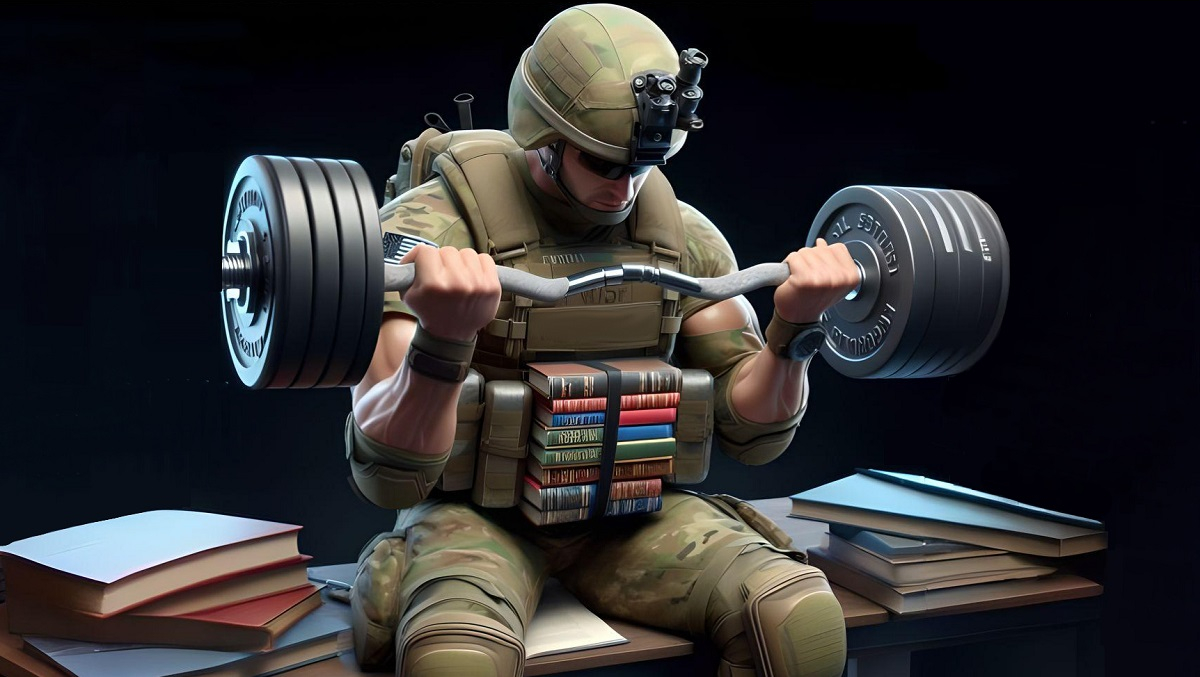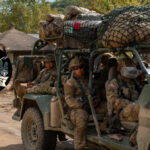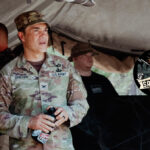
General Randy George, Chief of Staff of the Army (CSA), has identified four priorities for the service during his tenure: building cohesive teams, delivering ready combat formations, continuous transformation and strengthening the army profession. Today’s episode focuses on the profession, and we’re pleased to have Allison Abbe and Ron Granieri in the studio to discuss the Army War College’s efforts to support the CSA’s priorities. They join Editor-in-Chief J.P. Clark to examine both the traditional elements of the profession as well as the adaptations that must occur in light of the changing character of war and an evolving society.
The recent work of Drs. Richard Laquement and Thomas Galvin that Dr. Abbe mentioned can be found here Framing the Future of the U.S. Military Profession.
Our students will probably never again have to wrestle with the question of whether Athens could have won the Peloponnesian war…but having wrestled with that question, they will be better able one hopes to deal with the question in the future when the President of the United States…asks them about this or that strategic challenge. And so we’re helping to build up the muscles much the way the ACFT is building up the muscles.
Podcast: Download
Allison Abbe is Professor of Organizational Studies at the US Army War College. Her research focuses on the development of leadership, interpersonal, and intercultural skills in national security personnel. She has previously worked as a research psychologist and program manager in defense and intelligence organizations and holds a PhD in social and personality psychology.
Ronald Granieri is Professor of History at the U.S. Army War College. He previously taught at the University of Pennsylvania as well as other universities in the United States and Germany, and is Templeton Fellow at the Foreign Policy Research Institute. He is the author of The Ambivalent Alliance: Konrad Adenauer, the CDU/CSU, and the Politics of German Westbindung, 1949-1966 (2003), and is working on a book about German politics from the 1960s through unification as well as a history of the Atlantic Community.
JP Clark is an associate professor of military strategy teaching in the Basic Strategic Art Program. He served in the army for twenty-six years as an armor officer and strategist. He holds a Ph.D. and M.A. in history from Duke University, an M.S.S. from the Army War College, and a B.S. in Russian and German from West Point. He is the author of Preparing for War: The Emergence of the Modern U.S. Army, 1815-1917 (Harvard, 2017). He is currently working on a history of U.S. military strategy in the Pacific from 1898 to 1941 that is under contract with the University Press of Kansas. He is the 3rd Editor-in-Chief of War Room.
The views expressed in this presentation are those of the speakers and do not necessarily reflect those of the U.S. Army War College, U.S. Army, or Department of Defense.
Photo Description: U.S. Army Spc. Micheal Amoyo, left, and Sgt. Marisa White, with the 329th Movement Control Team, conduct the Sprint-Drag-Carry exercise of the Army Combat Fitness Test at Mihail Kogalniceanu Air Base, Romania, Oct. 25, 2023. The unit conducted the six-event ACFT to evaluate their readiness and preparedness to meet their mission while deployed.
Photo Credit: U.S. Army Reserve photo by Spc. Andrew Mendoza





In addition to the counter-factual exercise of asking our professionals to consider if and how Athens might have won the Peloponnesian War (in this regard, see the introduction to our podcast above), could we, also, have our professionals wrestle with the question of if and how the Soviets/the communists might have won the Old Cold War? For example, by having the Soviets/the communists, in this counter-factual exercise, (a) better recognize and acknowledge the deeply engrained conservatism of certain populations in most states and societies, by having the Soviets/the communists, accordingly, (b) not attempt to achieve too much political, economic, social and/or value change too thoroughly and/or too quickly — either at home or abroad — and by having the Soviets/the communists (c) better recognize that the U.S./the West — having an exceptional important stake in whether states and societies became communist — would work extensively “by, with and through” those more conservative/those more traditional individuals and groups who — both in the Soviet/the communist states and elsewhere — had the most to lose via these such Soviet/communist political, economic, social and/or value transitions. (Herein, the overall problem that the Soviets/the communists would have in doing the above, this would be the problem of the Soviets’/the communists’ deep political convictions which, much like U.S./Western deep political convictions, [a] demand more immediate, more thorough and more compete transformations — both at home and abroad — and which, thus, [b] largely ignore the problems addressed at my items (a) – (c) above?)
Question — Based on the Above:
Could the much more contemporary “how the Soviets/the communists could have won the Old Cold War” counter-factual exercise that I describe above — in addition to the “how Athens could have won the Peloponnesian War” counter-factual exercise addressed in the podcast introduction — could this much more contemporary counter-factual exercise, also, “help to build up the muscles much the way the ACFT is building up the muscles?”
Beginning on Page 10 of the referenced and linked publication “Framing the Future of the U.S. Military Profession,” a number of new challenges and strategic realities are listed re: the professional U.S. Army.
But does this list/these lists not omit — or at least not address with sufficient directness and clarity — what perhaps is the most important — and the most overarching — challenge and strategic reality facing professional militaries today? For example, as described below:
“In this new world disorder, the power of identity politics can no longer be denied. Western elites believed that in the twenty-first century, cosmopolitanism and globalism would triumph over atavism and tribal loyalties. They failed to understand the deep roots of identity politics in the human psyche and the necessity for those roots to find political expression in both foreign and domestic policy arenas. And they failed to understand that the very forces of economic and social development that cosmopolitanism and globalization fostered would generate turbulence and eventually resistance, as ‘Gemeinschaft’ (community) fought back against the onrushing ‘Gesellschaft’ (market society), in the classic terms sociologists favored a century ago.” (See the Mar-Apr 2017 edition of “Foreign Affairs” and, therein, the article by Walter Russell Mead entitled “The Jacksonian Revolt: American Populism and the Liberal Order.”)
These two (perhaps complementary?) observations, also, may help here — and/or may need to be considered — re: the challenges and/or strategic realities facing professional militaries today:
“Capitalism is the most successful wealth-creating economic system that the world has ever known; no other system, as the distinguished economist Joseph Schumpeter pointed out, has benefited ‘the common people’ as much. Capitalism, he observed, creates wealth through advancing continuously to every higher levels of productivity and technological sophistication; this process requires that the ‘old’ be destroyed before the ‘new’ can take over. … This process of ‘creative destruction,’ to use Schumpeter’s term, produces many winners but also many losers, at least in the short term, and poses a serious threat to traditional social values, beliefs, and institutions. … (These) threatened individuals, groups or nations (in turn) constitute an ever-present force that could overthrow or at least significantly disrupt the capitalist system.” (Items in parenthesis above are mine. From the book “The Challenge of the Global Capitalism: The World Economy in the 21st Century,” by Robert Gilpin; therein, see the first page of the Introduction chapter.)
“All in all, the 1980s and 1990s (and the 2000s and until now?) were a Hayekian moment, when his once untimely liberalism came to be seen as timely. The intensification of market competition, internally and within each nation, created a more innovative and dynamic brand of capitalism. That in turn gave rise to a new chorus of laments that, as we have seen, have recurred since the eighteenth century: Community was breaking down; traditional ways of life were being destroyed; identities were thrown into question; solidarity was being undermined; egoism unleashed; wealth made conspicuous amid new inequality; philistinism was triumphant.” (Item in parenthesis above is mine. See the book “The Mind and the Market: Capitalism in Western Thought” by Jerry Z. Miller; in this case, from the section therein on Friedrich Hayek.)
Note that the the challenges and strategic realities facing professional militaries today; note that these are not unique to our present time only but — as discussed above — “were also present a century ago” (see Mead above) and “have recurred since the eighteenth century” (see Miller above).
This being the case, then how might a review of relevant history help professional militaries, now, see their way through their similar problems today?
Consider the following re: the — somewhat omitted and/or down-played — capitalism, markets and trade-related “challenges and strategic realities” points that I try to make at my “B.C. says: March 17, 2024 at 1:45 pm” comment above:
At Page 16 of the publication “Framing the Future of the U.S. Military Profession,” there appears a sub-section entitled “Applying Force for Nonmilitary Purposes.” As to that such subject, consider the — exceptionally significant (but generally considered as non-military by the American public[?]) capitalism, markets and trade/ “development”/”state and societal transformation”-related focus noted below:
“Since the 1990s the focus of American international security policy has been focused on creating conditions for extending zones of security and prosperity to other states under the theory that ‘political as well as economic globalization would make the world safer — and more profitable — for the United States.’ Consequently, the United States saw expansion, rather than retraction, of American military presence around the world.” (See the 2016 edition of the book “Exporting Security: International Engagement, Security Cooperation, and the Changing Face of the US Military” by U.S. Naval War College Professor Derek S. Reveron; therein, see the bottom of Page 2 of the Introduction chapter.)
“a. An IDAD (Internal Defense and Development) program integrates security force and civilian actions into a coherent, comprehensive effort. Security force actions provide a level of internal security that permits and supports growth through balanced development. This development requires change to meet the needs of vulnerable groups of people. This change may, in turn, promote unrest in the society. The strategy, therefore, includes measures to maintain conditions under which orderly development can take place.” (Item in parenthesis above is mine. See our own Joint Publication 3-22, “Foreign Internal Defense;” therein, see Chapter II, “Internal Defense and Development” and Paragraph 2, “Construct.”)
Americans, thus beginning in the 1990s, saw that the U.S. military (and, indeed, the whole of the U.S. government?) was no longer being used for (the professional/the military?) purposes that they had were grown accustomed to for the previous 40 plus years; that is, to help prevent — and even to help roll back both here at home and there abroad — revolutionary (in this case communist) “modernizing” political, economic, social and/or value change.
In stark contrast, beginning in the 1990s, Americans saw that the U.S. military (and, indeed, the whole of the U.S./government?) was being used for what they may not have seen in their entire lifetimes; this being (the professional/the military [?]) purpose of helping to achieve — both at home and abroad — revolutionary (in this case capitalist, markets and trade-related) “modernizing” political, economic, social and/or value change.
(Thus, the observations made by Walter Russell Mead, Robert Gilpin and Jerry Z. Muller [not Miller, apologies] above — which address the “resisting revolutionary change” problems and turbulence — found both here at home and there abroad — which occurs with this such U.S. post-Cold War effort.)
Question — Based on the Above:
How exactly can militaries and governments — in such challenging “achieve revolutionary change in the name of capitalism, markets and trade” times as I describe above — build and/or retain their/a “professional” status; this, in their own eyes, and in the eyes of those that they serve?
(As to this such question, cannot a review of relevant history help us here; this, given that — as noted by Mead and Muller above — this is not the first time that these such capitalism, markets and trade-related challenges have confronted us?)